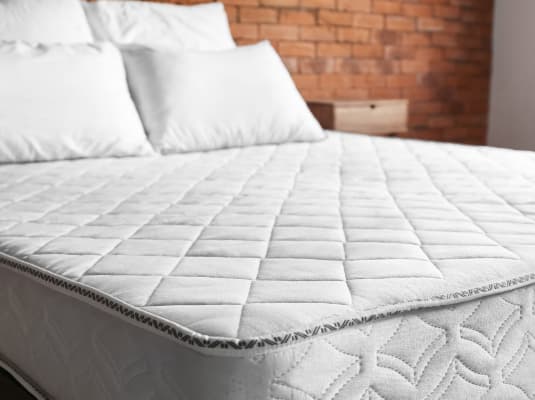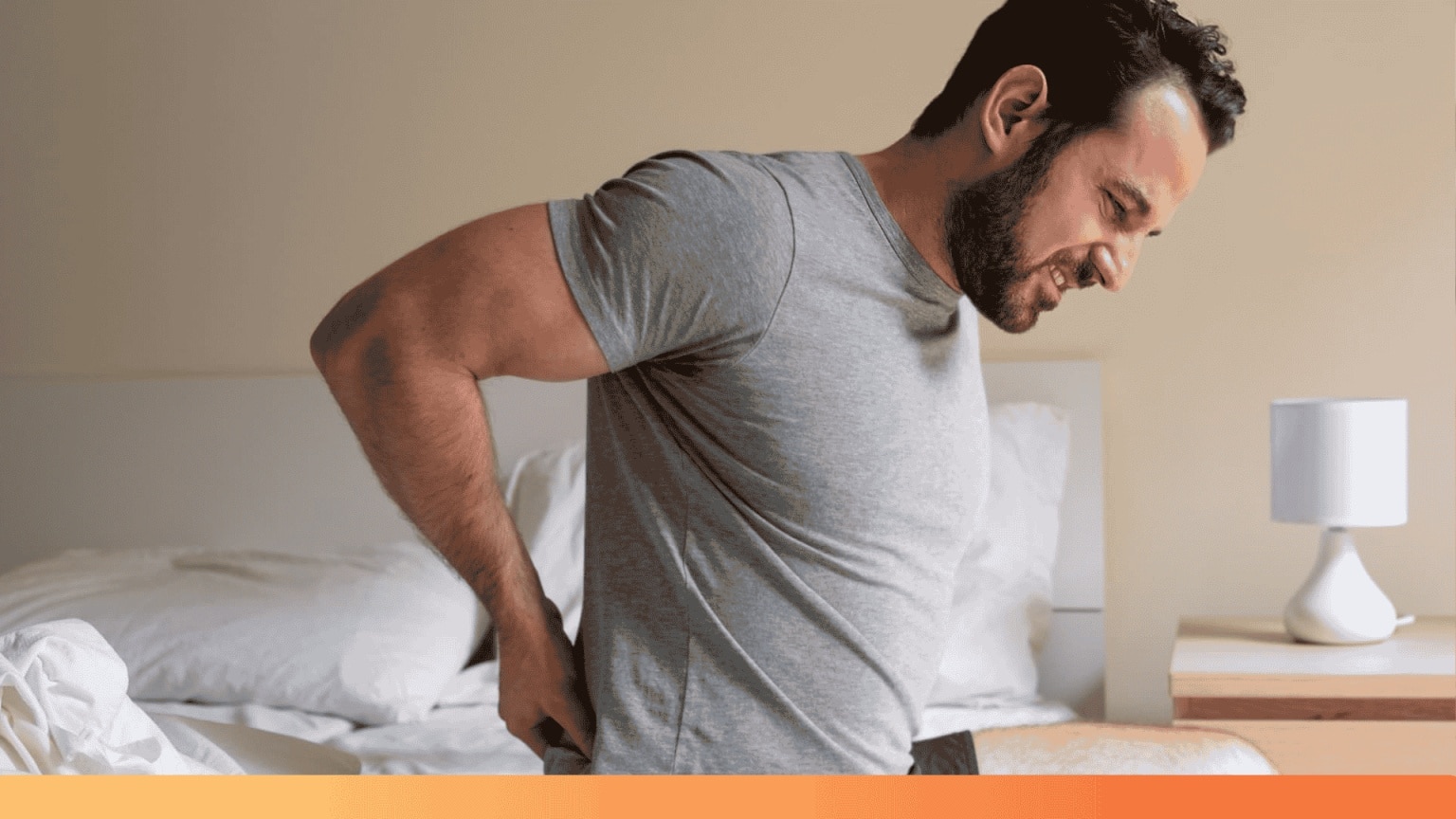Woke up with sore back? You are not the only one.
Waking up with lower back pain can cast a shadow over your entire day. If you’ve ever asked, “Why does my back hurt when I wake up?” or “What can I do about back pain upon waking?” you’re not alone. Researchers have identified low back pain as a major cause of poor sleep quality (Caggiari., et al. 2021).
Many people experience this discomfort and wonder how to find relief. Fortunately, understanding the causes and exploring effective treatment options that can help you start your day on the right foot.
Understanding the Causes of Lower Back Pain Upon Waking
Several factors might contribute to lower back pain that you notice right after waking up:
1. Sleeping Position:
Your sleep posture plays a crucial role in spinal health. Sleeping on your stomach can cause your lower back to arch un-naturally, leading to pain. Even side or back sleepers can experience discomfort if their posture isn’t correct.
2. Mattress and Pillow Quality:
An old or unfitting mattress can lead to misalignment of your spine, causing discomfort. Similarly, a pillow that doesn’t support your neck adequately can exacerbate back pain.

3. Muscle Strain or Previous Injuries:
If you’ve recently strained your back or experienced an injury, you might not feel the pain until you wake up. Activities that involve heavy lifting or sudden movements can strain your back muscles.
4. Poor Sleep Hygiene:
Poor sleep quality can contribute to back pain. If you’re not getting enough restorative sleep, your muscles may not have adequate time to recover. This can lead to stiffness and pain in the morning.
5. Underlying Health Conditions:
Chronic conditions such as mild arthritis can cause ongoing lower back pain that worsens after sleeping.
Effective Strategies for Relieving Lower Back Pain if you woke up with a sore back.
If you wake up with lower back pain or have back pain after waking up, there are ways to help reduce the discomfort.
1. Optimise Your Sleeping Position to avoid waking up with a sore back:
Experiment with different sleeping positions to find one that supports your spine. For many, sleeping on their back with a pillow under the knees can help maintain proper alignment. Side sleepers might benefit from placing a pillow between their knees to reduce strain on the lower back.
2. Evaluate and Adjust Your Mattress and Pillow:
A study found that a medium-firm mattress is best for good sleep and avoiding back pain. It helps with comfort, sleep quality, and back alignment, reducing back pain (Caggiari., et al. 2021).
Assess whether your mattress is providing adequate support. Your pillow should keep your neck aligned with your spine without causing your head to tilt forward or backward.
3. Incorporate Stretching and Strengthening Exercises to avoid waking up with lower back aches:
Gentle stretching and strengthening exercises can help alleviate morning back pain. Incorporate stretches that target the lower back, hips, and legs. Exercises like pelvic tilts, knee-to-chest stretches, and cat-cow stretches can improve flexibility and reduce stiffness.
4. Apply Heat or Cold Therapy:
Heat therapy, such as using a warm compress or heating pad, can help relax tight muscles and ease pain. Cold therapy, such as an ice pack, can reduce inflammation and numb the sore area. Alternate between heat and cold therapies to determine which provides the most effective relief for you.
5. Practice Good Sleep Hygiene:
Maintain a consistent sleep schedule and create a relaxing bedtime routine. Refrain from using screens before bed, and ensure that your bedroom remains cool, dark, and quiet. Good sleep hygiene promotes restorative sleep, which is crucial for muscle recovery and overall health.
6. Stay Active During the Day:
Regular physical activity can strengthen your back muscles and improve your posture. Incorporate low-impact exercises such as walking, swimming, or cycling into your routine. Staying active can also prevent stiffness and reduce the likelihood of waking up with back pain.
7. Use Topical Pain Relief:
Topical treatment options like fisiocrem Solugel offer effective relief for muscle aches and pains. Applying fisiocrem Solugel after waking up with a sore lower back can help reduce inflammation, and ease discomfort. This allows you to start your day with less pain.
Woke up with sore back from mild arthritis pain? Try fisiocrem Joint Ease - Mild Arthritis Relief cream
Woke up with a sore back? When to Seek Professional Help
- Pain that lasts longer than a few weeks
- Pain that changes or worsens over time
- Pain that doesn’t improve with home remedies
Preventive Measures for Long-Term Relief
To avoid waking up with lower back pain in the future, consider implementing these preventive measures:
1. Strengthen Your Core:
A strong core supports your spine and reduces the risk of back pain. Include core-strengthening exercises such as planks and bridges in your fitness routine.
2. Maintain a Healthy Weight:
Excess weight can place additional strain on your back. Aim to maintain a healthy weight through a balanced diet and regular exercise.
3. Use Proper Body Mechanics:
When lifting objects, ensure you bend your knees and maintain a straight back. Avoid twisting your body while lifting.
4. Ensure Ergonomic Workspaces:
If you spend long hours sitting at a desk, ensure your workstation is ergonomically designed to support your back. Use a chair with lumbar support and take regular breaks to stretch and move.
Conclusion
Waking up with lower back pain does not have to dictate the course of your day. By understanding the potential causes and implementing effective treatment options, you can manage and alleviate back pain.
Improving your sleep space and using pain relief creams like fisiocrem can help you wake up feeling better and with less discomfort.
If your back pain persists, don’t hesitate to seek professional advice to address any underlying issues and find long-term relief. Embrace these strategies to wake up feeling more comfortable and ready to take on the day with confidence.
FAQ
Waking up with a sore lower back can be from bad sleep position, a bad mattress or pillow, muscle strain, or health issues.
To alleviate morning back soreness, enhance your sleep quality, evaluate your mattress and pillow, and perform gentle stretches. Topical pain relief products like fisiocrem can also help relieve pain.
Prevent back ache by maintaining good sleep hygiene, staying active, and ensuring your sleep environment is supportive. Strengthening your core and using proper body mechanics can also help prevent future pain.
If your lower back pain worsens or persists despite self-care, consult a healthcare provider to receive appropriate treatment.
Pain in your lower back when you wake up and walk can because of muscle stiffness, poor sleep posture, or misalignment of your spine. Incorporate stretching and strengthening exercises into your routine to improve flexibility and reduce pain.
Yes, topical pain relief products like fisiocrem Solugel can be effective for easing back pain. Apply them after waking up to help reduce discomfort and inflammation.
Address waking up with back ache by adjusting your sleep posture, checking your mattress and pillow, and practicing good sleep hygiene. Incorporate daily stretches and consider using topical pain relief for added comfort.
References
- Caggiari, G., Talesa, G. R., Toro, G., Jannelli, E., Monteleone, G., & Puddu, L. (2021). Journal of Orthopaedics and Traumatology, 22(1).
















